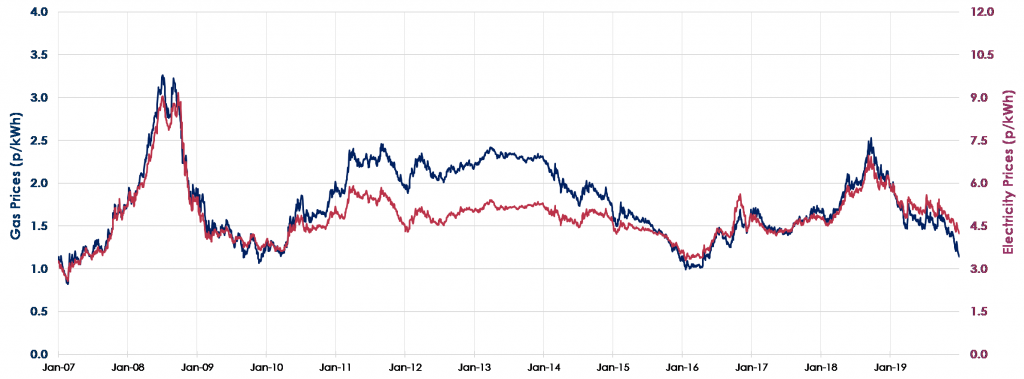UK gas and power prices posted strong losses during January. Gas prices ended the month 15.6% lower at 1.04 p/kWh in response to strong gas pipeline imports, plentiful LNG deliveries, high gas storage, no major outages and weak global demand. Despite withdrawals from storage, gas stockpiles in Europe are still around 72% of full capacity, meaning the region continues to be well supplied during the peak winter period from November to February.
Power also fell last month, losing 11.1% to 3.90 p/kWh in response to weaker gas, carbon and European energy prices.
Brent crude oil prices recorded its biggest January decline in 30 years, sliding 11.7% to $58.29/bbl, as the coronavirus epidemic hit forecasts for global economic and energy demand. Carbon lost 3.5% to €23.65/tCO2 as it was confirmed that the UK will commence allocating its 2019 and 2020 allowances in early March, following a year-long suspension on distributing its carbon permits was being lifted.
At 11pm on 31st January 2020, Britain formerly exited the European Union and entered a period of transition, after 47 years of membership.
The comfortable gas supply situation has resulted in UK gas and power prices falling to record low levels, last seen in 2016. However, colder temperatures in February and post-Brexit uncertainty could result in volatile gas prices for the rest of Q1-2020.
Prices are likely to be favourable for the next few months. But the unpredictable nature of energy markets closer to winter means businesses should start thinking about renewals now, and consider locking in longer-term gas and power contracts by the end of June.

Brexit: The UK has officially left the European Union after 47 years of membership – and three years after it voted to do so in a referendum. The historic moment, which happened at 11pm on 31st January 2020 was marked by both celebrations and anti-Brexit protests.
UK citizens will notice very few immediate changes, with most EU laws continuing in force until 31 December, when the transition period ends. The UK is aiming to sign a permanent free trade agreement with the EU, along the lines of the one the EU has with Canada.
Coronavirus: Nearly 12,000 people have been infected with a novel virus that originated in China’s city of Wuhan, with around 100 cases reported from 21 other countries. The Chinese government has responded to the outbreak by placing Wuhan and nearby cities under quarantine encompassing over 30 million people. The World Health Organisation has designated coronavirus a “public health emergency of international concern”.
Eurozone economy: Growth in the eurozone’s economy slowed sharply in Q4-2019, it by weak internal demand and a slowing global economy. France and Italy actually shrank in the period. However, there was more encouraging news with unemployment recording a decline. At 7.4%, it is the lowest since May 2008.
U.S.- China trade war: U.S. President Donal Trump and Chinese Vice Premier Liu He signed a deal in mid-January to roll out Phase 1 of a trade deal. U.S. trariffs will be cut on some Chinese goods in exchange for Chinese pledges to purchase more of American farm, energy and manufactured goods and address some U.S. complaints about intellectual property practices.
Middle East: Saudi Arabia sent a message that it wants to see a de-escalation of the United States’ struggle with Iran, raising concerns about its vulnerability to Iranian missle strikes – and still uncertain about the reliability of Trump’s long-term commitment to America’s Gulf allies.
Disclaimer: These views and recommendations are offered for your consideration and Beond makes every effort to ensure that the data and information in this report is accurate. However, due to the volatile and unpredictable nature of the energy markets, Beond cannot guarantee the accuracy of both the information and the recommendations provided. Beond does not accept any responsibility for errors or misstatements, or for any direct, indirect, consequential or other loss arising from any use of this information and/or further communication in relation to this information.